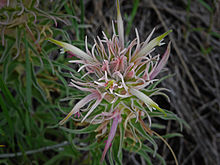Castilleja sessiliflora
| Castilleja sessiliflora | |
|---|---|

| |
| Scientific classification | |
| Kingdom: | Plantae |
| Clade: | Tracheophytes |
| Clade: | Angiosperms |
| Clade: | Eudicots |
| Clade: | Asterids |
| Order: | Lamiales |
| Family: | Orobanchaceae |
| Genus: | Castilleja |
| Species: | C. sessiliflora
|
| Binomial name | |
| Castilleja sessiliflora | |
Castilleja sessiliflora is a species of flowering plant in the family Orobanchaceae known by the common names downy Indian paintbrush and downy paintedcup. It is native to the Great Plains of North America from southern Canada, through the central United States, to northern Mexico. It occurs as far west as the eastern slopes of the Rocky Mountains.[1]
Description
[edit]This perennial herb produces one or more stems up to 35 centimetres (14 in) tall from a woody root crown. It is hemiparasitic, obtaining water and nutrients from other plants by tapping their roots. This Castilleja species has been observed parasitizing eastern redcedar (Juniperus virginiana) and oldfield juniper (J. communis var. depressa). It reproduces sexually and vegetatively by resprouting from its root crown.[1]
The petals are fused and form a curvilinear tube.[2] The sepals are shorter, with narrow lobes.[2] Altogether, the inflorescence is green, yellowish, and pink.[2]
This plant grows in several habitat types, including prairie, shinnery, Texas savanna, and shrubsteppe.[1] It is pollinated by a hawk moth.[2]
There is anecdotal evidence that Castilleja sessiliflora is less dependent on host plants than other members of its genus. The noted wildflower writer Claude A. Barr reported that a specimen was successfully moved by him into a garden where it lived for several years and produced one seedling without an apparent host.[3]
References
[edit]- ^ a b c Walsh, Roberta A. (1993). "Castilleja sessiliflora". Fire Effects Information System (FEIS). US Department of Agriculture (USDA), Forest Service (USFS), Rocky Mountain Research Station, Fire Sciences Laboratory.
- ^ a b c d Taylor, Ronald J. (1994) [1992]. Sagebrush Country: A Wildflower Sanctuary (rev. ed.). Missoula, MT: Mountain Press Pub. Co. p. 60. ISBN 0-87842-280-3. OCLC 25708726.
- ^ Barr, Claude A. (1983). Jewels of the plains : wild flowers of the Great Plains grasslands and hills. Minneapolis: University of Minnesota Press. p. 54. ISBN 0-8166-1127-0.
External links
[edit]- Castilleja sessiliflora in the CalPhotos photo database, University of California, Berkeley

